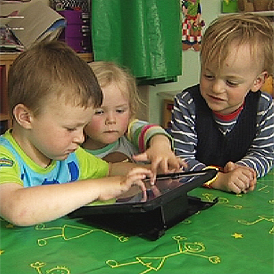App market explodes for techie toddlers
While the market for touchscreen apps aimed at pre-schoolers booms, many fear the effects smartphones and iPads will have on young brains, reports Asha Tanna.
They can barely read and certainly can’t write – but many toddlers have astonished their parents with how quickly they grasp new touchscreen technologies like iPads and smartphones.
Snapdragons Nursery in Bath is one of the first in Britain to use iPads to teach pre school children about numbers.
This digital technology has become part of the ‘nappy curriculum’ where educational apps are used to learn the basics about letters, numbers, shapes and colours, as well as drawing and even composing music.
James Collard from the nursery says it is an exciting way for children to learn.
“It’s very important for us that the children get exposed to these sorts of technologies because it is very prevalent and dominant in today’s society and it’s not really going away any time soon,” he said.
“We feel very strongly that children should have an opportunity to learn and educate and investigate through these tools whilst not limiting their exposure to traditional matter as well.”
While Snapdragons insists that iPads are only used as part of an interactive teaching day, there are concerns that exposing young minds to grown-up technology too early could compromise their development rather than stretch it.
There have been very few studies carried out on the claimed benefits of using educational applications.
In a study in America carried out by a parenting website babycentre.com it found 75 percent of mums regularly handed their smartphones to their children. PC World recently named the iPad the best toy of the year for young children.
Toddler gaming
According to some cognitive scientists there are fears that screen-based technology could interfere with children’s attention skills their ability to acquire literary skills and the capacity to read for pleasure.
But the creators of the online Moshi Monsters disagree. In just two years it has attracted 50 million subscribers aged 6 to12 years old in 150 countries.
The company says because it also offers educational games it makes it popular with both children and their parents.

“The game has been designed in a way to allow players or children to play for maybe five or 10 minutes every day. It’s not designed to replace homework or out of school activities,” Edward Relf from Mindcandy said.
But one literacy expert is worried that children’s fixation with digital gaming regardless of whether it’s educational or not, creates an expectation for instant gratification rather than teaching them real life experiences.
Sue Palmer, author of Toxic Childhood, told Channel 4 News children were being taught bad habits which would ultimately affect them later in life.
“If kids don’t learn to self regulate, learn to put off rewards at an early age, then they may not be able to take advantage of the education system,” she said.
“The point about new technology is it just gives you this instantaneous quick fix reward. They are programmed to reward you about every seven seconds.”
As with TV in earlier generations, the world is increasingly divided into those parents who are in favour of iPads and those who are not..
“With anything you have to be responsible and limit the content, they can’t be in front of any screen for too long,” mother Lisa Brett told Channel 4 News.
“I’m very strict about how much television my children watch. My son is not allowed to watch more than an hour’s TV a day. I prefer the iPad to passively sitting and watching a screen.
“This is something that he’s interacting with, it’s making him think, it’s responding to him, he’s learning.”
While the iPad won’t do the parenting for you, experts all agree that a careful balance is needed if your toddler is to get a head start in the academic race in life.